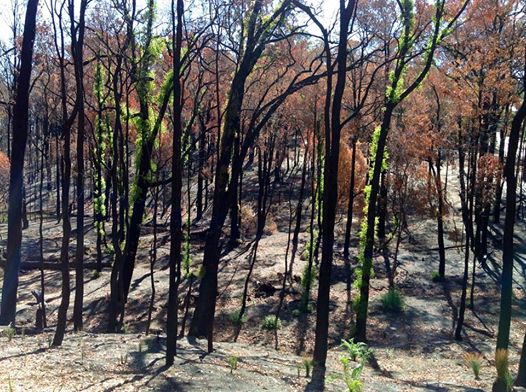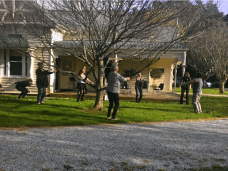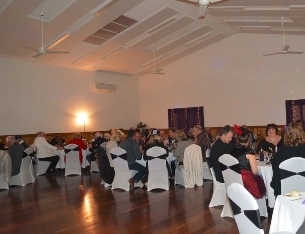Foundation for Rural & Regional Renewal (FRRR)
More than $1.5M earmarked to support ongoing recovery across the Kinglake Ranges following the 2009 bushfires has begun to roll-out through the Foundation for Rural & Regional Renewal’s Grants for Resilience & Wellness (GR&W) – Kinglake Ranges program. Two projects have received funding, both of which will be important pathways to further local investment.
Following a consultation process as part of the Kinglake Ranges Community Planning Project, a suite of 27 priority projects and initiatives were identified that the community would like to pursue. This planning was developed by Regional Development Victoria (RDV) in consultation with the Victorian Bushfire Appeal Fund (VBAF) Panel, Murrindindi Shire Council and community representatives from Kinglake, Kinglake Central, Kinglake West, Pheasant Creek, Toolangi and Flowerdale.
To help fast-track the development of the priority projects, Kinglake Ranges Neighbourhood House (KRNH) will host a part-time Community Development Officer for a year. This person, who has recently started in the role, will support local groups across the Kinglake Ranges to refine the project ideas identified through the community consultations. A Steering Group will provide strategic support, and FRRR will also provide a high level of support and advice to the Officer regarding the grant application process and eligibility.
“The 27 priority projects are now at the point where they need more detail, their feasibility needs to be tested and resourcing requirements determined. So FRRR will work closely with the Community Development Officer to support local groups involved in the consultation process to develop and progress these projects to application and delivery stage,” says Program Manager Recovery & Resilience, Emma Thomas.
“Eligible organisations will be invited to apply to the Grants for Resilience & Wellness (GR&W) – Kinglake Ranges Program in March 2020.”
An additional project funded by FRRR in support of the community planning will see Kinglake Ranges Business Network Inc (KRBN) engage a contractor to lead the development of the Kinglake Ranges Economic Development Program. Stage 1 of the development program will involve surveying the local business community to identify their training needs, and the results from the survey will be presented and discussed at an Economic Strategic Session with the local businesses. This will then inform a calendar of industry-focused development activities for 2020.
Ms Thomas says that the 2009 disaster negatively impacted the local economy and the mental health of business owners, so additional support is important.
“The fire affected local tourism, the local environment and changed consumer patterns. Local businesses have struggled to create a new normal and overcome loss of income and level of change, while dealing with their own personal recovery. Local business owners, therefore, need support, and FRRR looks forward to supporting this development as it progresses.”
Further details about the projects funded are below.
|
Organisation |
Project |
Location |
Awarded |
|
Kinglake Ranges Business Network Inc. |
Kinglake Ranges Economic Development Program – Stage 1 Strengthen the local economy in the Kinglake Ranges through scoping the training needs of local business and creating a calendar of industry focused development activities for 2020. |
Kinglake Ranges |
$17,637 |
|
Kinglake Ranges Neighbourhood House Inc. |
Kinglake Ranges Development Fund – Community Grant Development Officer Increase support for community organisations in the Kinglake Ranges to develop project ideas to grant application stage in order to access the Kinglake Ranges Development Fund. |
Kinglake Ranges |
$74,031 |
In 2013, the Mirboo North Community Bank brought the district and surrounds together to identify and prioritise the region’s future recovery and resilience activities following the 2009 Victorian bushfires. From the meeting, what became apparent was the gap in local education and training to support and engage the community in gaining practical skills and knowledge that would increase local capacity.

The Boolarra Community Development Group help promote the social, economic and environmental development of Boolarra and surrounds, taking lead from the community. They work as a liaison between local and state government departments, not-for-profits and community groups to achieve positive outcomes for the region.
They had attended the community meeting in Mirboo and recognised the opportunity to support their region to fill this training and education gap. Reaching out to the Boolarra community they identified a series of courses that would be in demand including event management, safe food handling, chainsaw training, barista training, small motor training, environmental gardening and first aid training courses.
Using a $19,950 grant from FRRR’s Grants for Resilience & Wellness grant program, funded by the Victorian Bushfire Appeal Fund, the Boolarra Community Development Group ran nine courses over a year. The Development Group works with local community groups to actively encourage members to participate in the training course. They also had a focus on increasing female participation, which was also identified as a community priority during their consultation.
In total, the courses attracted over 90 participants which was well above the expected target and an impressive feat for a small rural community. Each course was met with lots of positive feedback about the content and delivery of the training sessions.
The district is now benefiting from the breadth of skills and abilities available within the community, reducing the need for outsourcing and supporting the vitality of the region. Many participants flagged that they are interested in the potential for more workshops and training courses to run in the future.
Jindivick is a rural dairying community in the south-east of Victoria renowned for producing Jindi cheese and local gourmet produce. It is a small community striving to become put itself on the map as a popular tourist destination to strengthen its struggling local economy.
In 2009, Jindivick was affected by the Black Saturday bushfires – destroying homes, farms and local infrastructure. Residents and the surrounding communities worked hard to reconnect and recover from the devastating aftermath.

As the recovery effort evolved, it became apparent that it was going to take more than just repairing and rebuilding local infrastructure to restore the community. The bushfires had taken an enormous emotional toll on residents, and it was time for the community’s mental wellbeing became the recovery priority.
The Jindivick Progress Association developed an initiative to address the long-term effects of stress and grief that had plagued the local community, hosting five Community Wellbeing Retreats using a Grants for Resilience & Wellness grant of $14,750 funded by VBAF. Creating the promotional material, flyers and invites, the Jindivick Progress Association attracted 88 participants from the three local communities, Jindivick, Labertouche and Drouin West.
The retreats were able to provide the tools for relaxation and stress reduction techniques, education about nutrition, health and psychological wellbeing for the local community and were inclusive to men, women, young, older or disabled participants. The fifth retreat enabled Jindivick Progress Association to run a leaders retreat to reward community volunteers for their tireless work in the community.
The Jindivick Progress Association was able to engage the local community in the development of the retreats, supporting local business in the provision of catering and venues. Feedback from the events suggested that participants realised the importance of relaxation and caring for oneself, along with community engagement and connection. An overwhelming majority of retreat participants were supportive of the events continuing in future with one participant saying “I have had the value of community reinforced and enhanced. The value of support in times of struggle is inestimable.”
After the Glenburn pub was destroyed in the 2009 Victorian Bushfires, the local hall became a crucial hub for community cohesion in Glenburn. The Hall is now the place where locals gather, share experiences and welcome new residents, and the Progress Association hosts monthly dinners to build this sense of place and connection.
The Glenburn Hall & Progress Association Inc is a not-for-profit organisation that oversees and looks after the Glenburn Hall. The Association’s main aim is to provide the community with a meeting place that caters for all ages and walks of life.

The hall is used for community events, CFA information evenings, Neighbourhood Watch, a Craft Club and a Garden Club, among other things.
Resounding sound
In mid-2014, 30-40 people were attending a community gathering each Friday night, and monthly dinners on the third Friday of each month attracted 70-80 people. However, the Progress Association had noticed a decline in attendance at activities based at the community hall, and discovered that the reason why was because many ageing residents were having difficulty hearing because of the hall acoustics.
The Glenburn Hall Committee engaged acoustic engineers who established that the pitch in the roofline of the hall was creating a funnel effect, and that by placing sound absorbing panels on the roof, the issue would be rectified. By improving the hall acoustics, the Committee has removed a barrier to participation for older residents, however other benefits include improved sound for music and films, which help to increase financial viability.
The community now has access to a community meeting place that is a comfortable environment for all age groups.

